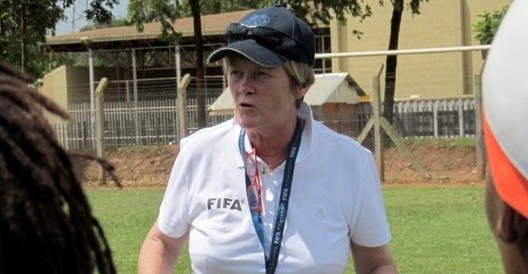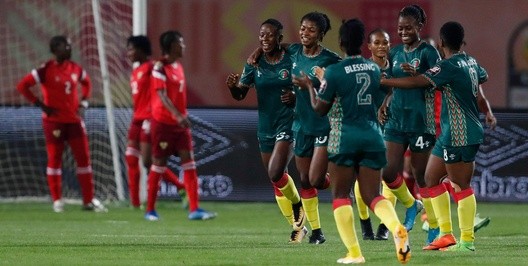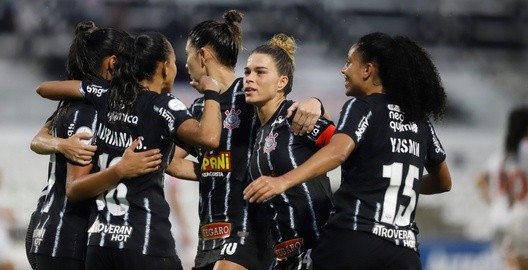Can Women's Champions League herald a new dawn for African game?

Alamy
Confederation of African Football have been accused of neglecting the women’s game in the past.
The Champions League must improve women’s football across the continent with more competition and more playing opportunities.
The vast majority of participants are still amateur clubs.
Interview with Fran Hilton-Smith former coach of the South Africa women’s national team.
The competition’s prize money remains shrouded in mystery, but even Europe and South America’s confederations also took time to introduce a proper kitty.
5 January 2022 - 2:00 PM
Noha Mamdouh Adelaziz will always be connected to the African Women’s Champions League. After two minutes of play, she stepped up from the penalty spot to score the first-ever goal in the maiden edition of the competition.
In the curtain-raiser, her club, Egyptian hosts Wadi Degla, went on to defeat their opponents AS Mande, the champions of Mali, who triumphed in the WAFU A qualifiers to qualify for the tournament, 3-1.
In an empty 30 June Stadium at the start of November, with football fans in the Egyptian capital focused on that night’s big derby between Al-Ahly and Zamalek, you could hear Mamdouh’s thud on the ball and the sound of the net. ¨
It didn’t feel significant and yet it was a historic moment: at last Africa had its very own flagship, continental club tournament in the women’s game, a sign that the Confederation of African Football (CAF) was taking women’s football serious.
At last. Or not?
Speaking from her home in South Africa, Fran Hilton-Smith remembers the time when women’s football was simply an afterthought for the regional governing body.
A former Banyana coach (South Africa women’s national team is nicknamed Banyana Banyana) and SAFA technical director, she says that “women’s football was a bother-why-thing.”

Fran Hilton-Smith
This was again illustrated recently when CAF (Confederation of African Football) cancelled the 2020 Women’s Africa Cup of Nations. The tournament didn’t even have an official host.
Neglect the women’s game
At the time, Isha Johansen, a member of CAF’s organising committee for women’s football, defended the decision.
She said that “there were circumstances that were beyond our control which made it difficult for CAF to organise it and don’t get me wrong here, all options were explored but to no avail.”
The cancellation of the continent’s flagship tournament was a huge setback, and according to critics and observers, a confirmation that CAF neglected the women’s game.
Across the continent, women’s players have limited playing opportunities with few fixtures on both the domestic and international calendar. Cancelling the Africa Cup of Nations, then, was altogether cruel.
Even so, change was afoot. CAF established a women’s department, a “true turning point” according to Hilton-Smith, with the department aiming to ‘grow participation, improve the game and promote and change perceptions’.
A great revolution
At workshops, planning the future of the women’s game, Hilton-Smith advocated for the launch of a Champions League to ensure Africa would become more competitive.
“The Women’s Champions League is a great revolution in the history of African women’s football,” said Kanizat Ibrahim, CAF’s fifth vice-president, who also chairs the organizing committee for women's football.
“CAF is the second confederation to set up a Champions League. Apart from the success, it can generate in the media, I wish that the competition takes up a place on the global stage in terms of organization, but also evokes strong emotions on the continental level and shakes up stereotypes that some still have about women's football.”
Johansen added that CAF was seeking “the highest level of professionalization”.
But the promise of revolution by Ibrahim, who headed FIFA’s normalization committee in the Comoros before joining CAF, remained shrouded in mystery.
On the eve of the tournament, question marks lingered over the competition’s prize money, sponsorship and media visibility. Ibrahim couldn’t disclose the exact prize money CAF had allocated to the competition.
“There is a discussion between the Administration and the Executive on this matter,” said Ibrahim.
“A budget for the Women's Champions League was proposed during the Executive Committee meeting.”
Broadcast partners
Total doubled up as tournament sponsor. The French energy giant is also CAF’s title sponsor.
With hours left until the opening match, CAF announced broadcast partners for the competition: SuperSport in Sub-Saharan Africa and beIN Sports in the MENA region, North America and the Asia Pacific territories including Australia, New Zealand, Thailand, Indonesia, Singapore, Malaysia and Hong Kong.
The CAF website and FIFA TV streamed matches to the rest of the world.
“It’s a developmental tournament,” assessed Hilton-Smith.
Prevented from attending in person due to a knee replacement, she watched on Supersport how the hosts defeated Mali’s strongest club but failed to progress from the group stages.
In Group B, the favorites did prevail. Not that Rivers Angels from Nigeria and Vihiga Queens from Kenya simply rolled over.
Established as an independent women’s club in 1986, the Nigerians had pedigree. They were seven-time domestic champions with internationals Tochukwu Oluehi, Joseph Vivian and Ologbosere Mary in their ranks.
Propped up by the state government of Port Harcourt, Angels have a significant budget, but well below 100 million Naira (€215,370).
It’s a club that is professional in name only. Gate receipts are minimal and broadcast income is non-existent in the Nigeria Women Premier League.
Player salaries are negligible. Even in the men’s league, some players don’t earn more than 120,000 Naira (€258) a month. Vihiga Queens FC operates on a shoestring budget as well and is run along amateur lines.
“You have to ask the league,” said Rivers Angels coach Edwin Okon when quizzed about the financial predicament of the women’s club game.
Club owned by the family of CAF president
Ultimately, the pre-tournament favorites Mamelodi Sundowns, the club owned by the family of CAF president Patrice Motsepe, won the competition defeating Ghana’s Hasaacas Ladies 2-0 in the final.

Alamy | Hasaacas Ladies on their way to the CAF final which they ultimately lost to Mamelodi Sundowns
“It’s not common for professional clubs in South Africa to have a women’s team,” describes Hilton-Smith the South African scene.
“In many ways, it is still seen as an expense. It’s all still amateur, even though we have Hollywoodbets, the title sponsor of the women’s league.”
The Champions League is a top-down manner to develop the women’s game in Africa. In the long run, the competition must give more playing opportunities to African clubs, achieve a more level-playing field and lift the overall quality of the African women’s game.
“This will make other countries want to participate in the next edition,” said Ibrahim.
“It will be more in demand. Ultimately, the ideal would be to adopt the same format as the men’s competitions. But, before we get there, we have to popularize women’s football by training the players and the technical staff. Financial resources dedicated to women’s football must be mobilized.”
To advance the professionalization of the game, CAF introduced a women’s club licensing system for clubs participating in the Champions League.
Licensing manager Muhammad Sidat said that clubs will need a proper women’s club to compete in the tournament in the future.
Junior girls teams
“The competition has just given so much more impetus to the club game,” says Hilton-Smith.
“The participants were competent. There were no 20-0 score lines like England - Latvia. That was important for the standard. The coverage was massive. The wide TV coverage, hopefully, will encourage sponsors.
“The airport was full to meet Sundowns, with banners. It was like the respect for the men’s team. It has raised Sundowns’ profile. They announced that they will start junior girls teams, a massive development.
“I foresee it having a real snowball effect, but the prize money would be the big thing of interest in the long term.”
Both Asia and CONCACAF are yet to launch a continental club tournament, but the introduction of prize money has also been slow elsewhere.
In South America, Corinthians, the Brazilian winners of the 2021 Copa Libertadores Femenina received €75,000 from the final.

Alamy | Players from Corinthians celebrating a goal in the semifinal of Copa Libertadores Feminina against Club Nacional
However, continental governing body CONMEBOL has announced an increase in prize money with the winners getting $1.5 million and the runners-up $500,000 in 2022.
The competition was launched in 2009, around the time that UEFA established prize money for the Women’s Champions League after a decade without.
In the European competition, clubs have often struggled to cover their expenses. Last season, Denmark’s Brondby struggled to meet UEFA’s Covid-19 protocols for their away match to Lyon and asked fans for donations to fly with a charter to France, costing $43000, and book single hotel rooms. The club’s annual budget is $324,864.
With more prize money this season, UEFA will have allayed fears of clubs’ needing to fundraise again. Every group stage participant receives €400,000. The competition’s winners can earn as much as €1.4 million.
As for Mamelodi Sundowns’ prize money? No one knows. CAF have remained silent. At least, Tlhopie Motsepe, the chairman of Sundowns, promised a reward for the African champions.
